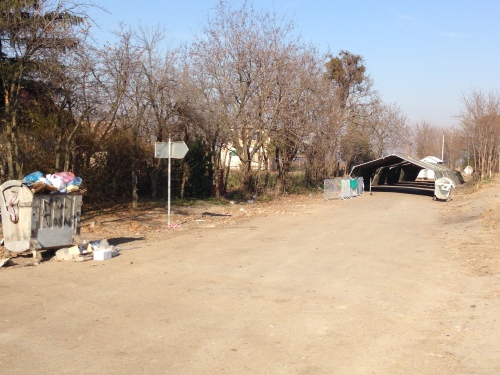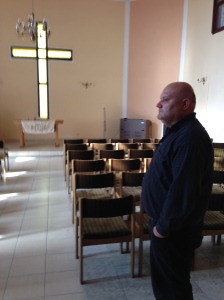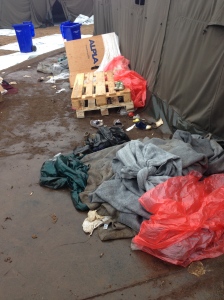“Everything changed again this morning,” the pastor said, “I’m so sorry I’m late.”
Constant change—that is the only unchanging constant in this refugee crisis.
I had driven over to Šid, Serbia for a few hours to deliver some donated money for food packets and talk to one of the pastors in charge of the NGO which had been serving the refugees since their arrival.
“The changing situation has been the most difficult thing, ” the pastor answered when I asked him what the biggest challenge had been since the refugees began to flood the small town of 70,000 in August. “We have to constantly adapt as the situation and locations of the refugees change.”
But the news of this morning was that Slovenia would no longer accept ‘economic migrants,’ namely, anyone not from Syria, Afghanistan, and Iraq. This began a chain reaction in Serbia, Macedonia, and Croatia.

Three weeks before, this was packed with cold and shivering people. Now, under the unseasonably warm sun, a solitary trash bin is the only evidence that remains.
I don’t blame the governments for making this decision as the numbers of people continue to climb—in the last 24 hours, 5,180 people arrived in Croatia, and over 416,000 have already passed through since mid-September.
But the problem is that now there will be stranded groups of people everywhere, although I don’t doubt that some will try to continue their journey out of the limelight.
In fact, when I left Serbia and was about 15 km into Croatia, I saw a group of refugees on the side of a cornfield. The police were there, lights flashing, with more on the way. I don’t know what the story was, but it wouldn’t surprise me if this group had heard the news and was trying their own method of crossing.
“What the Serbian government will do with the people sent back, I don’t know,”the pastor told me. “How will the government and the churches deal with this new challenge of all these people left here who cannot move further?”
I imagine the government will come up with some plan to send people back to their home countries. Regardless of their motivation for coming, and whether or not I think it is right or wrong that they be sent back, I try to imagine the crushing disappointment this news would be if I were in their shoes.
To have high hopes and travel so far…only to have missed the window of opportunity.
This situation only grows more complex with no easy answers.
“When this first began, ” the pastor said, “the things I saw stayed in my head for 10 days. The feeling of helplessness.”

The pastor left me soon after this to go chop wood for the church’s heating supply for winter.
“I was touched by the people with small children, newborns, who are constantly moving, walking for days…I witnessed a lot of trauma from the people who ran away from the war and came across the sea to come to us. I witnessed women giving birth at the border. And somehow a person as an individual becomes helpless in everything.”
I guess I was wrong—here is another constant. In all this complexity, despite the resilience, perseverance, and creativity required for each person to reach Serbia, there is still an undeniable level of helplessness involving anyone who leaves her country. Will I be sent back or allowed to stay? Will I have food, water, and shelter? Will strangers be kind to me? Will I survive?
Somehow my thoughts go to the Christ child—helpless and dependent on his parents for food, shelter, and safety.
Somehow, I find it comforting that Jesus can identify with the very human feeling of helplessness.


